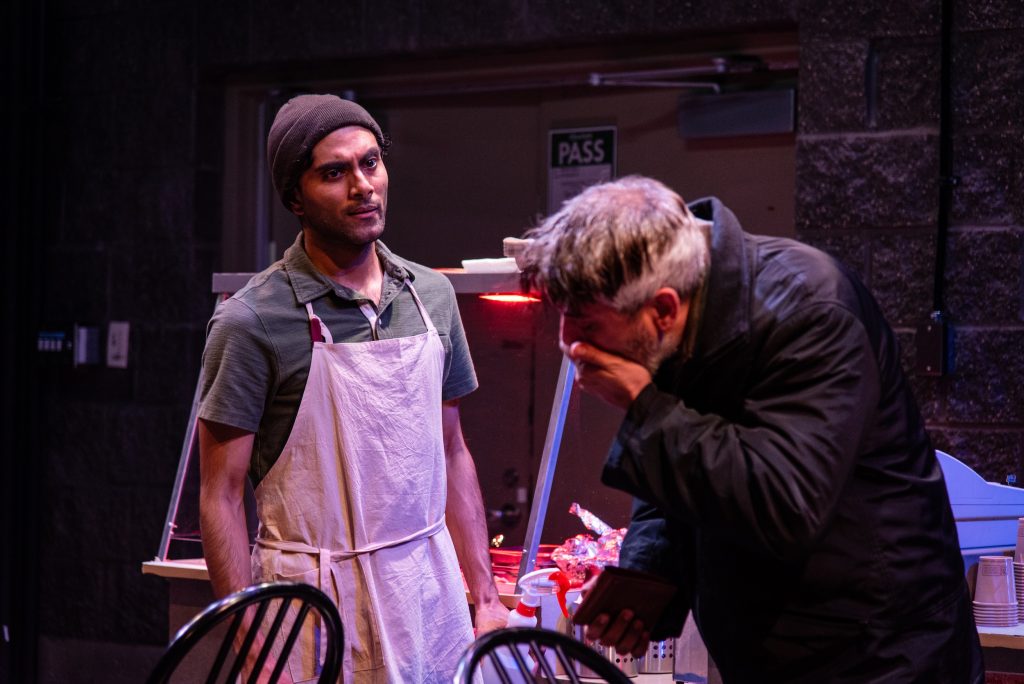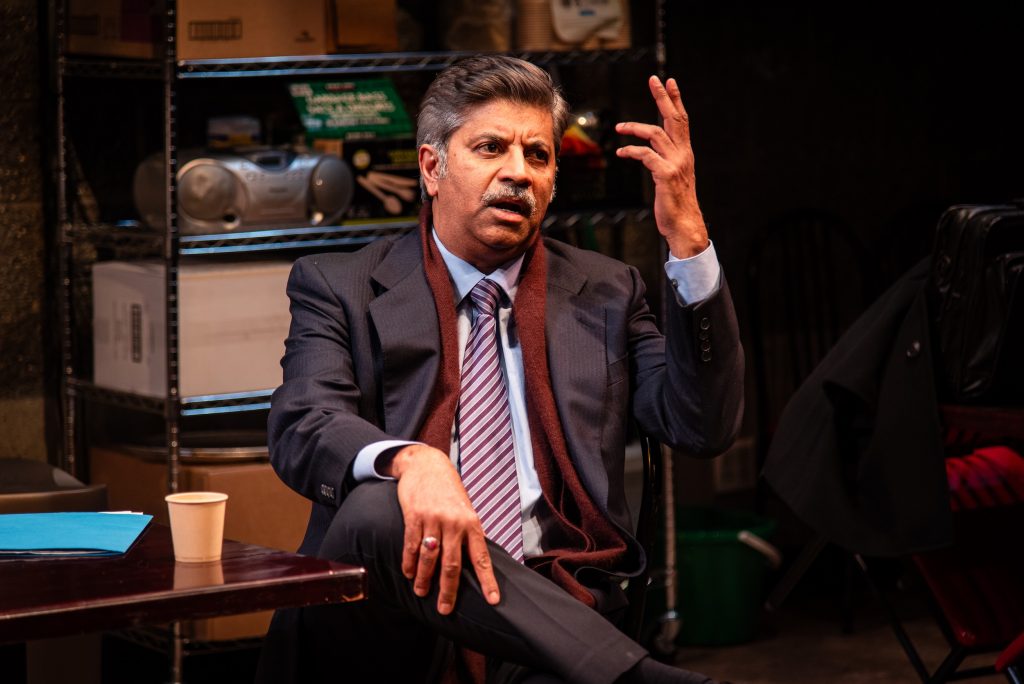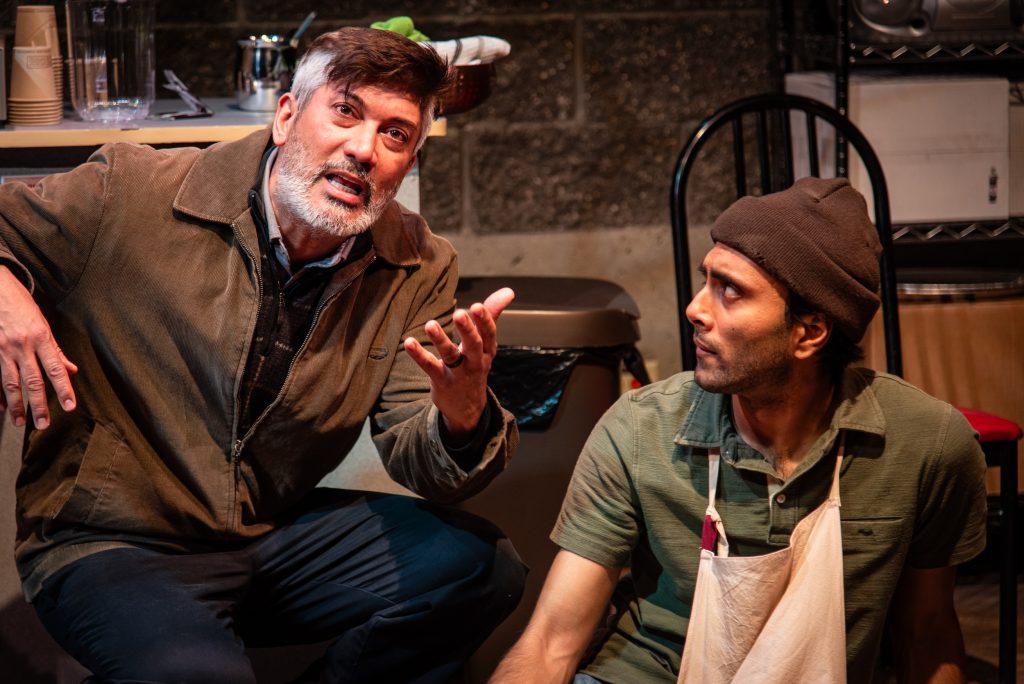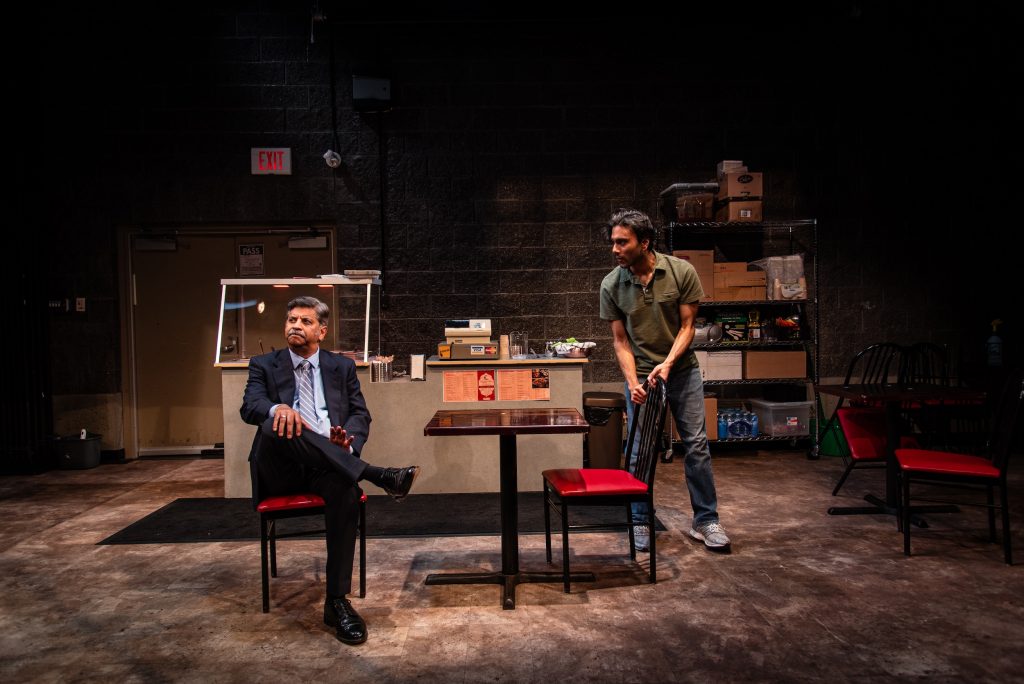
Credit: Chelsey Stuyt
Vancity Culture Lab at the Cultch to April 6, 2025
Tickets from $39 at 604-251-1363 or www.thecultch.com. Many performances sold out.
Posted March 29, 2025
As Easter approaches, appreciation for family and culture loom large in my life. My family are not church-goers nor does the Easter bunny hide chocolate eggs around the house anymore – more’s the pity – but we still look forward to getting together as a family of three born-in-Canada generations for dinner. Easter would not be Easter without it.
And so, Anosh Irani’s new play, Behind the Moon, presented by Touchstone Theatre, resonated profoundly with me. What courage it takes to leave one’s homeland and family behind as Ayub (Praneet Akilla) does, in search of a better life for the family. And what a grave disappointment it must be to find oneself preyed upon by a countryman who came to Canada before you.

Credit: Chelsey Stuyt
Upon the death of Ayub’s father, Qadir Bhai (Dhirendra) promised to look after Ayub, to help him emigrate from Mumbai to Toronto, to give him work in his fast-food restaurant, the Mughlai Moon. But four years have passed and Ayub is no closer to becoming a Canadian or to bringing his wife Fatima and his child to Canada. Instead, he’s the sole employee in Qadir Bhai’s hole-in-the-wall restaurant, working long hours, cooking and cleaning, cooking and cleaning. He longs for his family while his employer continues to grow rich and to expand his business. It’s not clear whether Ayub is even being paid but if he is, it’s paltry. Not enough to fly home nor given the time off to do it.
The situation is dire and I confess to sitting in the theatre and feeling rage at the injustice of it. But then Jalal (Zahf Paroo), a mysterious taxi driver and immigrant from Kashmir, arrives late at night after closing, desperate for Indian food. “It’s an emergency”, Jalal says and, reluctantly, Ayub gives him some butter chicken: “One dead chicken smeared in butter.” Jalal continues to come to the Mughlai Moon after hours and a strange, complicated friendship grows.

Credit: Chelsey Stuyt
Under the direction of Lois Anderson, artistic director of Touchstone Theatre, the performances of Akilla, Dhirendra and Paroo are so real, so committed, that I felt I was eavesdropping on a real situation. As Ayub, Akilla is a mess of nervous energy, twitching, blinking, scrubbing the floor until you fear the tiles will dissolve under the scrub brush. His character’s very existence depends on the goodwill of Qadir Bhai and Akilla, as Ayub, is like a whipped puppy begging for kindness.
Dhirendra’s Qadir Bhai is a self-satisfied man who feigns concern about Ayub but who takes advantage of him, enslaves him. So convincing is Dhirendra’s performance that I felt rage rising in me. Not often in the theatre am I unable to disconnect the actor from the character but the power of his performance was overwhelming. Qadir Bhai is truly unbearable especially when talking about his son, about to become a lawyer, and Cindy Smith (non-Indian, obviously), the woman his son is about to marry. Plus, he has an impending deal for a new restaurant in Montreal. By Qadir Bhai’s standards, he is a huge success but his good fortune does not extend to Ayub who, in part, contributes to that success.
So opposite to Qadir Bhai is Jalal and Paroo’s performance is all goodness and kindness. But Paroo also shows Jalal’s mettle, a point beyond which this character will not go: “Do not beg”, Jalal tells Ayub. Paroo gives us a good man that is firm, resolute and decent.

Credit: Chelsey Stuyt
Patrick Rizzotti’s realistic set serves the play well: a small counter of Indian food behind glass, small tables, chairs, storage. Lighting design is by Jonathan Kim with soundscape by Joelysa Pankanea. Excellent food following opening night was provided by Bombay Masala and chai from Chai Wagon, for which we were grateful. Sitting in a theatre for a couple of hours looking at butter chicken, rice, and stewed mutton had its reward!
The dénouement of Behind the Moon had me close to tears – not sorrowing but uplifting. Behind the Moon ends exactly as it should, not perhaps as we hope stories of immigration will end but as they sometimes ought to end. Snow, after all, is not for everyone.

